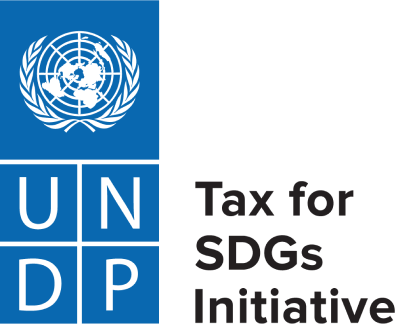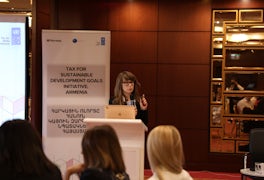Public finance is a powerful lever for advancing gender equality. This is especially pertinent in Africa, where fiscal challenges coexist with opportunities for transformative solutions. By prioritizing investments in health, education and social protection—sectors critical to empowering women and marginalized groups—governments can foster inclusion and resilience. Reimagining domestic resource mobilization (DRM) through equitable tax and fiscal policies transforms fiscal challenges into opportunities, paving the way for more inclusive and sustainable societies.
Domestic resource mobilization is increasingly seen as a critical pathway for African countries to achieve the Sustainable Development Goals (SDGs) and the African Union's Agenda 2063. However, many tax systems in the region remain regressive, disproportionately burdening women and marginalized groups. These systems often overlook the ways gender influences unpaid care work and income levels, reinforcing economic disparities and slowing progress toward inclusive development.
This need for reform took center stage at the African Tax Administration Forum (ATAF) Annual Meetings, held from December 3–5 in Kigali, Rwanda. Attended by over 582 officials from African Ministries of Finance, Tax Administrations, Members of Parliament, Development Partners, tax experts, and private sector representatives, the meetings explored the theme “Preparing for the Future: Revenue Administration in a Dynamic Global Landscape.” A critical focus was on how tax systems can address inequality, particularly gender inequality. Delegates emphasized that gender-responsive taxation is fundamental to sustainable development.
Insights from the Gender Equality Session
UNDP showcased its commitment to gender equity through tools like the SDG Taxation Framework (STF) and the Gender Equality Seal for Public Institutions (GES). The STF helps countries align tax strategies with specific SDG targets, while the GES encourages public institutions, including tax administrations, to embed gender equality principles into their operations. The GES also serves as an accountability mechanism and a driver for continuous improvement in gender mainstreaming.
At the meetings, Dr. Innocente Murasi, Deputy Commissioner General of the Rwanda Revenue Authority, said “Most tax officials were just ignorant of the part tax administrations play in promoting gender equality for a long time. The STF has shed light on doable measures to transform the Rwanda Revenue Authority into more than just a government revenue collection organization; with UNDP's help, it can also significantly contribute to the implementation of inclusive development policies. There is unquestionably a steady link between mobilizing domestic resources and promoting gender quality.” Similarly, Ms. Esiri Agbeyi of PricewaterhouseCoopers underscored the Seal’s role in integrating gender considerations into tax administration. She highlighted the collaboration between UNDP and the Federal Inland Revenue Service (FIRS) at the federal level, as well as with the Revenue Services of Ondo and Kaduna States at the subnational level, which has led to the successful implementation of the GES in Nigeria. Veronique Herminie, Chair of ATAF’s Women in Tax Network (AWITN), advocated for inclusive, equitable, and intergenerational approaches to tax policy, aligning with UNDP’s support for gender-responsive reforms.
A recurring theme at the meetings was the importance of closing gender gaps in taxation to foster economic growth and social equity. The use of gender-disaggregated data was identified as a priority mechanism for enabling policymakers to evaluate the impact of tax policies on men and women. Such data-driven insights can inform measures like tax incentives for women-led enterprises and the elimination of discriminatory practices. Training for tax officials on gender-responsive practices is also critical, as is collaboration with civil society and women’s rights organizations to ensure inclusive policymaking.
Modernized tax systems that prioritize gender equity have been shown to yield broader benefits, including sustainable development, reduced economic disparities, and increased public trust. By addressing structural barriers to women’s economic participation, gender-responsive taxation unlocks opportunities for inclusive growth and development.
UNDP’s initiatives driving gender equality in public finance
In line with these recommendations, UNDP continues to drive gender equality through initiatives such as Equanomics and Tax for SDGs, which aim to reform biased tax systems and promote equitable public finance. Under the Equanomics initiative, early successes include Eswatini's repeal of gender-biased tax laws, while countries like the Philippines and Colombia have benefited from technical assistance to design gender-equal tax policies. Rwanda and Nigeria have implemented the Gender Equality Seal, strengthening institutional commitments to gender equity.
Under the Tax for SDGs Initiative, tax officials from countries including Bhutan, Botswana, Colombia, Comoros, Eswatini, Honduras, Kenya, Lebanon, Lesotho, Nigeria, Rwanda, Sri Lanka, Tanzania and Zimbabwe have utilized the SDG Taxation Framework (STF) to analyze policies and advance SDG-aligned tax reforms.
Way Forward
The 2024 ATAF Annual Meetings reaffirmed the vital role of gender equality in tax reform and sustainable development. Integrating gender considerations into taxation can break down structural barriers, enhance women’s economic participation, and drive inclusive growth.
Looking ahead, UNDP plans to expand the scope of its Equanomics initiative in Africa, focusing on collaboration between the UNDP Sustainable Finance Hub and countries such as Kenya, Rwanda, Tanzania, and Zimbabwe. Key priorities include collecting gender-disaggregated data, strengthening gender-sensitive capacity-building programs, and fostering partnerships with civil society and development organizations. Through these efforts, UNDP will continue to champion gender-responsive public finance as a cornerstone of sustainable development.




